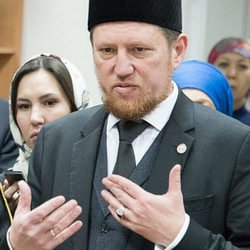How coronavirus affects religious holidays in Tatarstan
The COVID-19 pandemic and its consequences for Kazan believers
The coronavirus pandemic has affected everybody, including people who have different religions. The restriction on the number of participants in public events in Tatarstan has influenced upcoming religious holidays. “Separate” decrees appeared in religious organisations too. And if this almost hasn’t affected Orthodox Christians — they still can gather for sermons, but Kazan Jews have cancelled upcoming Passover in the synagogue. While Muslims are waiting for new recommendations from the Tatarstan Muslim Spiritual Directorate and the republican government on the threshold of Ramadan. Read more in Realnoe Vremya’s report.
Tatarstan Muslim Spiritual Directorate: “We are asking you to understand”
Ramadan will begin on 23 April when the sun sets. Believers will start fasting the next day after the sun rises, they will also stay clear of drinking, intimate relationships and bad thoughts. A meal is served when the sun sets. Such meals are usually held in company, often at mosques. Also, the hungry are usually fed, the poor receive help during the month. The believers will celebrate Eid al-Fitr on 24 May, which marks the end of the fasting month. The holiday is held at cathedral mosques with a lot of people.
However, the coronavirus epidemic has made its amendments to plans of the Tatarstan Muslim Spiritual Directorate (MSD).
“The Tatarstan muftiate has started the preparation for upcoming Ramadan. However, given the sanitary and epidemiological situation in the republic, country and world, it is early to talk about plans for the events during this period. At this stage, the council of scholars and regional qadis of the Tatarstan Muslim Spiritual Directorate is preparing information about the [accurate] dates of the beginning and end of Ramadan and Eid al-Fitr, fasting rules and tarawih, the order of Zakat al-Fitr and so on. Education will be given on time,” the press service of the spiritual directorate commented for Realnoe Vremya.
The muftiate is asking to understand the situation and reminds people that a special sanitary and epidemiological regime was announced in Tatarstan until 15 April, while anti-coronavirus measures are taken at mosques and in religious establishments to save believers’ lives and health considering authorities’ requirements.
Last week, the Tatarstan MSD drew up recommendations for mosques during the epidemic. The rules apply to not only Friday prayers but also wedding, name giving, funeral ceremonies and other rituals where a lot of people traditionally gather.
It is recommended to read prayers with a mosque’s workers only. There must be an opportunity for parishioners at mosques and in prayer rooms to read five prayers alone. Friday sermons have been limited to compulsory acts: the compulsory Friday sermon in the Arabic language and salah. A sermon in the Tatar language that was traditionally given at “Allah’s houses” of the republic, has been cancelled, in fact.
However, those believers who are seriously concerned about their health or in the risk group (the elderly, those with poor health) aren’t recommended to visit mass religious events, including the Friday sermon. The parishioners should avoid traditional handshakes and hugs. The Tatarstan MSD also stops face-to-face educational events in subordinate religious establishments. Later the muftiate tightened the requirements and recommended not to visit mosques. Those in medical masks who have disinfected their hands are allowed to Friday sermons.
By the way, Friday prayers have been temporarily cancelled at mosques in neighbouring Bashkiria. Mufti and Chairman of the Muslim Spiritual Directorate of the Republic of Bashkortostan Aynur Birgalin advises reading usual noon prayer instead of Friday sermons. Moscow also refused Friday collective sermons. While the mosques of Bashkiria that are under the jurisdiction of the Central Muslim Spiritual Directorate of Russia Talgat Tadzhuddin chose the Tatarstan road.
“We are ready for any turn, but…”
At the same time, Tatarstan imams don’t know so far how evening meals will take place during the fasting month. Everybody is waiting for instructions from the officials of the Tatarstan MSD. It isn’t excluded that there won’t be traditional Ramadan tents this year, and believers will break their fast at home. But as Chief Imam of Help mosque in Kazan Ildar Bayazitov assured, the believers will anyway fast.

It should be noted that Help mosque specialises in work with disabled people. And all classes and rehabilitation events had to be completely cancelled.
“Courses for disabled people in wheelchairs were due to start on 1 April,” Bayazitov went on. “There were a lot of tears, it was the last hope for them. We explained that this situation was temporary, asked to be patient. We are ready for any turn.”
Kazan eparchy: “We don’t consider restrictions”
Another holiday awaits Orthodox Christians on 19 April — Easter. Consequently, Holy Week will be from 13 to 19 April when churches will have services. And the Tatarstan Metropolis of the Russian Orthodox Church isn’t going to cancel the services and introduce restrictions due to the coronavirus. As we were said in the Kazan Eparchial Administration, the churches keep working as usual: people still gather, celebrate communion, pray here.
“We aren’t considering restrictions on parishioners’ visit by Easter, before Easter and after Easter,” secretary of the Kazan Eparchy Vladimir Samoylenko told Realnoe Vremya.
However, the Russian Orthodox Church is anyway taking certain measures. According to Father Vladimir, priests are asking the parishioners to meet hygiene rules, all Tatarstan churches are using disinfectants to wipe icons, single-use cups are used.
The rooms are aired from time to time, there are dispensers with disinfectant for parishioners. Those who felt bad are insistently recommended to stay home. The elderly account for a big share of parishioners — they should avoid visiting the church. Corresponding instructions came from Patriarch Kirill.
It should be noted that Metropolitan of Kazan and Tatarstan Feofan (Ashurkov) expressed his opinion about the COVID-19 pandemic during a sermon before Easter.

According to Metropolitan Feofan, Christians must promise God to fix their life to be forgiven. The head of the Tatarstan metropolis urged his people to not only pray but also follow hygiene, including the hygiene of the soul.
Chief Tatarstan rabbi of Tatarstan: “We have cancelled the general celebration”
Jews will celebrate Passover from 8 to 16 April. But the community of Jews in Kazan won’t celebrate the holiday this year. Shabbat, which is usually celebrated in the synagogue isn’t held in Kazan any more.

Our interlocutor added that he made such a decision after insistent persuasion of foreign colleagues. Rabbis from Europe, America and Israel called Kazan and said: “Everything is calm now there, close the synagogues now to avoid what happened here”. Moreover, all classes held in the synagogue became online. Itskhak Gorelik explains to his parishioners why they should stay at home without trying to provoke panic:
“Passover is one of the brightest holidays, a lot of people gather there. We had ambitious plans, a lot of guests from different cities were to come. But we don’t risk in such a situation. We have a lot of representatives of the older generation we should take care of, respect them. This is why we recommend everybody to stay home. So the disease will spread less, and the pandemic will step back faster. We are sure that God that waits for us in the synagogue is saying to us now to stay at home so this passes, and we, healthy, can go back and gather.”
As for the compulsory detail of Passover — matzo, it still can be bought in Kazan. One can go to the synagogue and take this unleavened flatbread — without queues and long contact with people of the same religion.